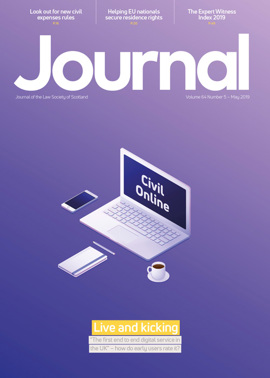Accredited paralegal practice area highlight: family law

There are currently 12 practice areas in which paralegals can become accredited. This month we take a look at family law.
Each practice area has a corresponding set of competencies which we would expect an accredited paralegal working in that area to be meeting. If you are a trainee accredited paralegal, we would expect you to meet these after one year of training.
A paralegal should be able to progress the various stages of a simple undefended case from taking instructions through to obtaining decree. In defended actions the paralegal should be able to assist the principal solicitor in progressing actions through their various stages to a proof, including gathering information, preparing motions, and paperwork for child welfare hearings.
Specifically, a paralegal should be competent to:
- draft simple separation agreements following a meeting between client, solicitor and paralegal;
- prepare lists of assets and liabilities;
- prepare initial writs for solicitors to revise and sign off;
- complete simplified divorce forms for signature and draft simple undefended divorce actions;
- prepare inventories, schedule of matrimonial property, affidavits, service of documents (all for review by the solicitor);
- interview distressed clients;
- take precognitions/statements from clients and/or witnesses;
- advise clients about the legal grounds, and general procedures, for divorce;
- arrange practical issues in relation to contact;
- arrange mechanisms regarding payment of aliment, spousal aliment and periodical allowance.
There are currently 27 accredited paralegals in the practice area of family law, and we would love to see this number increase.
In this issue
- Claiming under the advance payment scheme
- Time for a written constitution
- New form F9: worth the wait?
- Wedded to a matrimonial property regime
- Brexit divorce set to increase UK's “skype families”
- Corporate personality: Justice v Doctrine
- Reading for pleasure
- The Law Society of Scotland Expert Witness Index 2019
- Opinion: Judith Robertson
- Book reviews
- Profile: Michael Clancy
- President's column
- Is your legal data being held to ransom?
- People on the move
- Sign up – log in – action!
- Frozen out?
- Taxing times for litigators
- DNA analysis: when research just isn’t enough
- Brexit focus: EU citizen settlement remedies
- Why employers should report on wellbeing
- 3% – and then what?
- 1,000 days of mediation
- Barred from acting
- To name or not to name?
- Enter the “What I Think”
- Fixed penalties and fair trials
- Auto-enrolment: keeping employers on their toes
- Scottish Solicitors' Discipline Tribunal
- Vulnerable accused: a need for knowledge
- Burdens and who can enforce them
- Convener’s final bow
- Public policy highlights
- TCSP review update
- Westminster: answering the call
- Accredited paralegal practice area highlight: family law
- Accredited Paralegal Committee profile
- Nyona named star paralegal
- Ask Ash
- Moving nightmares part 2
- Complaints: seeking consistent practice
- Morally bankrupt?
- For the elderly: how SFE works
- Standing up to challenge






